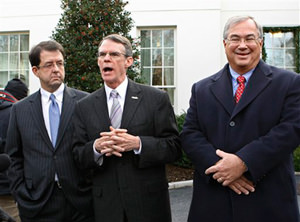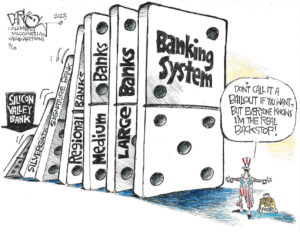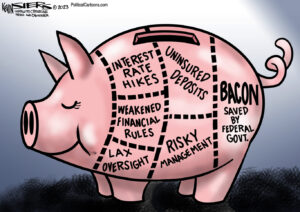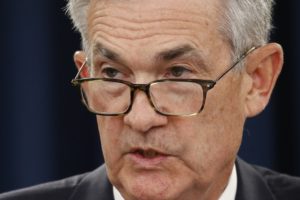Wall Street’s Fat Cats Are Still in Charge
Most Americans now know that Wall Street bankers are so greedy as to never be trusted, and I suppose it is a sign of progress that our president finally seems to grasp the obvious.Most Americans now know that Wall Street bankers are so greedy as to never be trusted. Our president finally seems to grasp the obvious.
Most Americans now know that Wall Street bankers are so greedy as to never be trusted, and I suppose it is a sign of progress that our president now seems to grasp the obvious. How depressing, though, that a man who was elected as a consequence of one of the boldest grass-roots populist campaigns in this nation’s history should now feel obligated to offer the disclaimer that “I did not run for office to be helping out a bunch of fat cat bankers on Wall Street.”
But whatever his intentions, Barack Obama has in fact accomplished just that, to the immense anger of the public that elected him. Thus, it is understandable that, in his “60 Minutes” interview last Sunday, Obama lashed out at the ingrate bankers whose greed he had served but who have failed to seriously increase lending or forestall foreclosures and instead shamelessly pocketed the cash the government threw their way:
“They’re still puzzled why is it that people are mad at the banks. Well, let’s see,” he said. “You guys are drawing down $10 [million], $20 million bonuses after America went through the worst economic year that it’s gone through in — in decades, and you guys caused the problem. And we’ve got 10 percent unemployment.”
But what did the president expect from those guys after he and his Republican predecessor were so quick to reward them so handsomely for their failures? In a reversal of the guiding principles of the meritocracy that informed Obama’s own success story, the president promoted, rather than flunked, the people who got it all wrong.
One of those was Larry Summers, who as Bill Clinton’s treasury secretary pushed through the radical deregulation that enabled disastrous Wall Street greed. But although Summers pocketed a cool $15 million from Wall Street in 2008 as he was advising Obama the candidate, he seems at last to have gained some awareness that the rules of the game he helped write now need to be changed. Speaking of the very bankers who once so handsomely paid him for his services, Summers, now Obama’s top economic adviser, told CNN: “Here is what I think they don’t get. … It was their irresponsible risk-taking in many cases that brought the economy to collapse.”
Summers is upset that the banking bandits he once so slavishly adored are now opposing even the tepid legislative reforms that the administration supports. The banking lobby is in full-frontal assault mode on efforts of Senate Democrats, led by Chris Dodd, to establish a single bank regulator who might actually bring the industry to heel.
The largest of the banks — the very ones that led the charge into the financial abyss — are fiercely lobbying against the very sensible and all-too-limited proposals that would increase their capital requirements and empower the government to prevent them from growing to unmanageable proportions once again. They are even more incensed about attempts to regulate the rewards that bankers reap from risking the capital of their depositors and the taxpayers who ultimately foot the bill.
However, Obama’s stern rhetoric apparently did not move the top banking honchos who failed to show up for this week’s White House meeting with the president. The heads of Goldman Sachs and Morgan Stanley waited until the morning of the Monday meeting to catch a plane and then claimed that fog prevented their journey.
Citigroup Chief Executive Vikram S. Pandit couldn’t make the meeting with the president who had saved his corporation from bankruptcy because he was too busy lining up new private financing to allow Citigroup to escape the bonus confines and other limits stipulated by the government bailout program.
No bank bears greater responsibility for the economic debacle that has caused such worldwide suffering than Citigroup, whose immense growth was made possible by legislation that Summers and his then-mentor, Clinton Treasury Secretary Robert Rubin, successfully promoted in the late 1990s. Rubin was rewarded for his efforts with a top job at Citigroup, which was formed from one of the largest mergers in history and which paid him $120 million before its fortunes plummeted. The bank is by no means out of the swamp of its own creation, as it still holds a huge portfolio of toxic assets, is still sustained by substantial public assistance and was trading Tuesday at less than $4 a share — a tiny fraction of its value before Rubin led it astray.
It was Rubin, as an Obama adviser, who pushed for Pandit’s selection as head of Citigroup. Perhaps Obama could enlist Rubin’s aid in getting Pandit to accept the president’s invitations to the White House. But of course there is no expectation of getting Rubin and Pandit to pay back the bankrupted homeowners they swindled.
Your support matters…Independent journalism is under threat and overshadowed by heavily funded mainstream media.
You can help level the playing field. Become a member.
Your tax-deductible contribution keeps us digging beneath the headlines to give you thought-provoking, investigative reporting and analysis that unearths what's really happening- without compromise.
Give today to support our courageous, independent journalists.




You need to be a supporter to comment.
There are currently no responses to this article.
Be the first to respond.